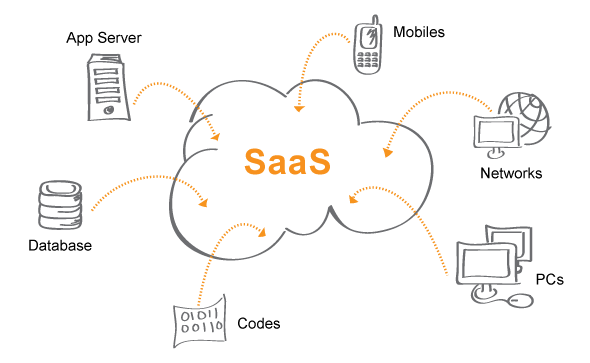Based on the service models that they provide, cloud services may be broadly divided into three types: Software as a Service (SaaS), Platform as a Service (PaaS), and Infrastructure as a Service (IaaS). For users and providers, each kind denotes a distinct degree of abstraction and responsibility. Below is a summary of each kind:
- IaaS, or infrastructure as a service:
IaaS uses the internet to deliver virtualized computer resources. On a pay-per-use basis, users can access virtual computers, storage, and networking components.
Use cases include running custom apps, hosting virtual machines, testing and development, and provisioning infrastructure.
As an illustration:
EC2 from Amazon Web Services (AWS)
Virtual Machines on Microsoft Azure
Compute Engine on Google Cloud.
2.PaaS, or platform as a service:
Description: Platform as a Service (PaaS) provides a platform with databases, middleware, development tools, and other components, hence offering a greater level of abstraction. While the service provider maintains control over the underlying infrastructure, users concentrate on the creation and implementation of applications.
Use Cases: Development, deployment, and administration of applications without requiring attention to underlying infrastructure.
As an illustration:
Heroku
Azure App Service for Microsoft
App Engine for Google
3.Software as a Service (SaaS): Description: SaaS delivers software applications over the internet on a subscription basis. Users access the software through a web browser without worrying about installation, maintenance, or infrastructure management. Use Cases: Email services, customer relationship management (CRM), office productivity tools, collaboration tools. Examples: Microsoft 365 (formerly Office 365) Salesforce Google Workspace (formerly G Suite) In addition to these primary service models, there are other cloud service categories that focus on specific functionalities:
- Serverless computing, or function as a service (FaaS):
In reaction to events, serverless computing enables developers to execute certain functions or segments of code without having to worry about maintaining the infrastructure. Users are billed according to the functions that are actually performed.
Use Cases: Microservices, automated tasks, and event-driven systems.
As an illustration:
AWS Lambda Functions on Azure
Functions of Google Cloud.
- DBaaS, or database as a service:
By offering managed database services, DBaaS relieves users of the burden of maintaining, backing up, and managing database infrastructure.
Use Cases: Hosting and managing databases without requiring a lot of administrative work.
As an illustration:
RDS on Amazon
SQL Database on Azure
SQL on Google Cloud
Organizations can select from a variety of options offered by these cloud service models according to their particular requirements and desired degree of control over the underlying infrastructure and services.





Top comments (0)